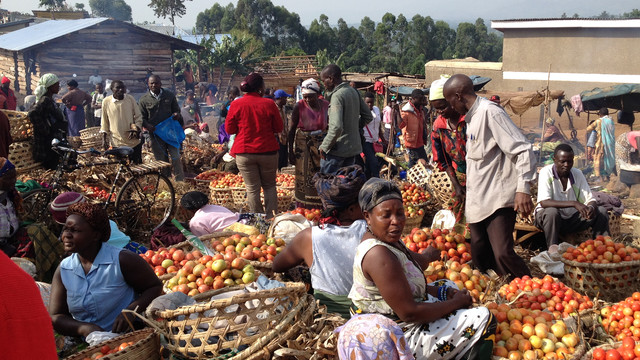Building fairer food futures
Powerful images from Uganda and Indonesia highlight the importance of informal food vendors in the food systems of the rural and urban poor.


This car park area below the alun-alun of the Masjid Raya Mosque in Bandung is a 'green zone', where street vending is permitted by the Bandung authorities. But business is slow and the environment is poor (Photo: Kemal Jufri/Panos Pictures)
How and where people get their food is changing, driven by shifts in urbanisation, trade, and consumption.
This change is especially marked in the food systems of the rural and urban poor. Families are unable to access nutritious food after long and demanding shifts and increasingly rely on informal food vendors to secure their daily meals.
In planning for urban growth, policymakers can overlook the food system of poorer citizens, and are often hostile towards informal food vendors, who are seen as a threat to health, law and order, and flow of traffic.
However, this can change once you engage citizens themselves in planning.
Hivos, IIED and local partners are working with citizens in 'Food Labs' that allow community members and policymakers to discuss and innovate in the design of more inclusive and nutritious food systems.
The organisations began work in 2015 in two locations where street vending and urban growth struggle to coexist, but where urban authorities are open to new designs.
A first set of powerful images from these locations played a vital role in a seminar in the Netherlands. Entitled 'Future food seminar: from challenge to design', it brought together a range of perspectives and thought-provoking ideas for the re-invention of global strategies for the design of our future food system.
The seminar was organised in the context of Age of Wonderland, a social innovation programme developed jointly by Hivos, Baltan Laboratories and Dutch Design Week.
Two different locations with a common story
Fort Portal in western Uganda is a small town with big potential. It is a rapidly urbanising, important commercial hub in an otherwise rural area of small-scale farms. How change is managed affects everyone.
Chris Byamukama, 27, is a food vendor and chairman of the Fort Portal Food Vendors Association. Take a look at a typical day for Chris...
With 2.5 million inhabitants, Bandung in West Java is a major city. Informal street vendors are vital, providing both food and employment.
One such street vendor is Ato who, with his wife Wanti, prepares traditional West Javanese snacks to sell at the Tegalega market. Here's their story...
The Hivos and IIED 'Food Labs' initiative will grow to include more locations over the coming months, across Africa and Asia.
We hope this will be the beginning of change, the chance for people to build their own fairer food future.




















